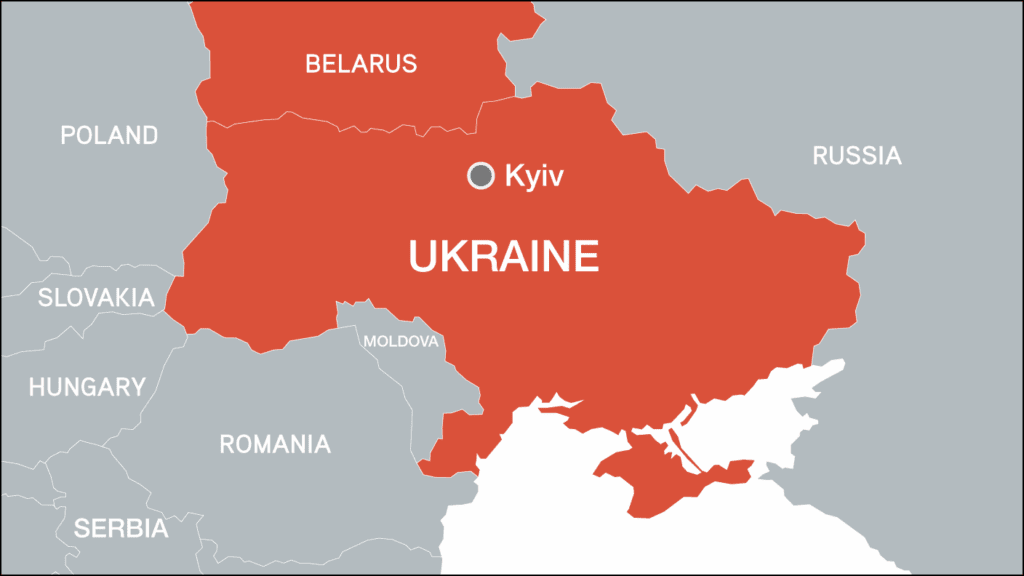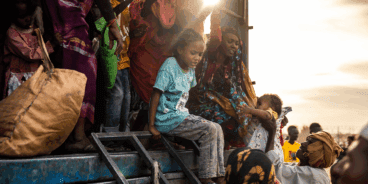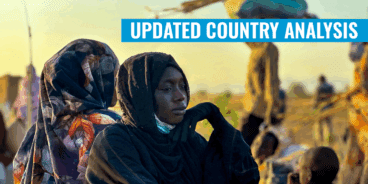Ukraine

Russian forces have perpetrated possible war crimes and crimes against humanity since their invasion of Ukraine. Ukrainian forces have also committed potential war crimes.
BACKGROUND:
On 24 February 2022 Russian Armed Forces launched a full-scale invasion of Ukraine. Since then, cities and towns across the country have been bombarded with indiscriminate explosive weapons and Russian forces have perpetrated likely war crimes, including indiscriminate attacks, systematic use of torture and sexual and gender-based violence. The UN has verified more than 14,534 civilian deaths as of 13 November 2025 and emphasized that there are likely thousands of unverified casualties. The conflict has caused a massive humanitarian crisis, displacing at least 10 million people, including more than 6.5 million who have fled to neighboring countries.
The UN Human Rights Monitoring Mission in Ukraine (HRMMU) has documented the widespread use of heavy artillery and multiple launch rocket systems, unguided missiles, airstrikes and illegal cluster munitions in populated areas. Since March 2024 civilian casualties have significantly increased due to Russia’s escalating use of powerful air-dropped bombs with wide-area effects. According to the HRMMU, these modified bombs – designed to glide and strike from greater distances – have caused extensive civilian harm, as the aerial bombardments strike well beyond conflict front lines with low accuracy. Schools, homes, water and sanitation systems, energy-related infrastructure and civilian shelters have been routinely targeted. The World Health Organization has verified over 2,650 attacks on healthcare since February 2022. The UN Educational, Scientific and Cultural Organization has verified damage to at least 509 cultural and religious sites. In areas under their control, Russian forces have perpetrated killings, rape and torture. Mass graves and burial sites have been found in areas retaken from Russian forces.
Ukrainian and Russian forces have committed abuses against prisoners of war (POWs), including torture and ill-treatment, and have prosecuted accused “collaborators,” according to the HRMMU. The UN has further documented violations by Russian-affiliated mercenary operatives from the Wagner Group against POWs, including enforced disappearances, ill-treatment and extrajudicial executions, which may amount to war crimes under international law.
Intense fighting also continues in Donetsk and Luhansk oblasts, a region collectively known as Donbas. Conflict has been ongoing in Donbas since 2014 after a pro-European change of power in Kyiv prompted the Russian government to militarily support majority-ethnic Russian separatists. An estimated 14,000 people were killed and millions displaced between 2014-2022 and the International Criminal Court (ICC) found evidence of war crimes and crimes against humanity. According to international monitors, both sides have continued committing violations that may amount to war crimes.
The ICC has issued arrest warrants for six Russian officials, including President Vladimir Putin and former Defense Minister Sergei Shoigu, for war crimes and crimes against humanity in Ukraine, such as forcibly transferring children and attacking civilian areas. The Court also opened a field office in Kyiv to support over 150,000 war crimes cases. Separately, after Ukraine filed a case at the International Court of Justice (ICJ) under the Genocide Convention, in March 2022 the Court ordered provisional measures, demanding Russia suspend military operations. In February 2024 the ICJ ruled it cannot decide if the invasion violated the Genocide Convention but will examine Russia’s claim that Ukraine committed genocide in Donbas – one of Russia’s justifications for the invasion.
Russia’s aggression in Ukraine has been widely condemned and many states and intergovernmental organizations have responded with targeted sanctions, economic measures and other restrictions. Some states have provided Ukraine’s military with weapons, including banned cluster munitions. The UN General Assembly has passed numerous resolutions that have demanded humanitarian access to civilians, condemned and insisted on the immediate reversal of Russia’s annexation of occupied Ukrainian territory and called for reparations and justice for violations of International Humanitarian Law (IHL).
RECENT DEVELOPMENTS:
Civilians in Ukraine continue to bear the brunt of escalating attacks, with recent strikes marking some of the deadliest incidents since the war began. Addressing the UN Human Rights Council on 8 September, UN High Commissioner for Human Rights Volker Türk reported that more civilians were killed and injured in July than in any month since May 2022, with a 40 percent increase in civilian casualties in the first eight months of 2025 compared to 2024. Overnight from 30 and 31 July, a large-scale aerial assault on Kyiv killed at least 31 people, including five children, and injured over 159 others.
Since 27 August, when Russian forces resumed strikes on Kyiv, killing at least 23 people, including four children, attacks have intensified. On 7 September Russia launched aerial attacks across multiple regions, including Kyiv, targeting civilian infrastructure. At least four civilians, including an infant, were killed and a government building destroyed in the capital. In the frontline region of Donestk, a 9 September airstrike killed more than 24 civilians, mainly elderly retirees waiting to receive their pensions.
In October both the United States and the European Union launched new sanctions aimed at curtailing Russia’s strikes on Ukraine, targeting Russia’s oil, gas and banking sectors.
ANALYSIS:
Violations and abuses perpetrated by Russian forces in areas under their control may amount to war crimes and crimes against humanity including killing, rape and the systematic use of torture against civilians, as well as grave crimes against children, such as killing, maiming, unlawful transfers and deportations.
Civilians in Ukraine are at increased risk as Russian forces target residential buildings and other civilian infrastructure with relentless drone and rocket strikes with wide-area effects. Ukrainian forces have also perpetrated violations and abuses of international law as they continue a counteroffensive to regain territory. Although the conflict is stagnant in Donbas, civilians on either side of the front lines remain at increased risk as Russian and Ukrainian forces continue to use banned cluster munitions.
Parties to the conflict have utilized rhetoric that may amount to incitement to violence, increasing the risk of ethnic-based targeting. The CoI is investigating rhetoric utilized in Russian state and other media that may constitute incitement to genocide. Russian officials have also implemented anti-Ukrainian curriculums for children in occupied areas.
Despite efforts by external parties to broker peace, the vast differences in the preconditions for talks expressed by Ukraine and Russia, respectively, highlight the increasingly slim opportunity for negotiations that would bring a lasting end to the conflict.
RISK ASSESSMENT:
-
-
- Failure to adequately halt and address violations of IHL and International Human Rights Law in eastern Ukraine since at least 2014.
- Russia’s pattern of violence against civilians, their property, livelihoods and cultural symbols and blatant disregard for IHL.
- Large-scale airstrikes and use of long-range and unguided weapons by Russian forces and counteroffensive by Ukrainian forces.
- Increasing polarization, marginalization of minority populations, propaganda and inflammatory speech.
- Impunity for orchestrators and perpetrators of war crimes and crimes against humanity.
-
NECESSARY ACTION:
Parties to the conflict must strictly adhere to IHL and ensure the protection of civilians. All violations must be investigated and perpetrators held accountable. Legal proceedings for those accused of crimes must be transparent, impartial and respect international standards of due process and proportionality.
Amid the protracted crisis, the international community must continue to pressure Russian authorities to halt their aggression in line with the ICJ’s provisional measures, including by closing loopholes in sanctions on dual-use items and third country imports and exports. The international community should maintain its support to Ukraine in upholding its international obligations to protect its populations, including by ensuring the territorial integrity of the country, within the parameters of international law. The international community should also continue to support those in need of humanitarian assistance.
Peace must be brokered through a process that includes all parties to conflict and addresses protection and security concerns for Ukrainian and Russian civilians. Additional protections must be provided to civilians around negotiations, as both sides have increased aerial attacks during these periods.
Atrocity Alert No. 449: Myanmar (Burma), Ukraine and North Korea
Related Content

Atrocity Alert No. 461: Israel and the Occupied Palestinian Territory, Global Landmine Report and Ethiopia

Atrocity Alert No. 459: Sudan, Ukraine and Conflict-Related Food Insecurity
